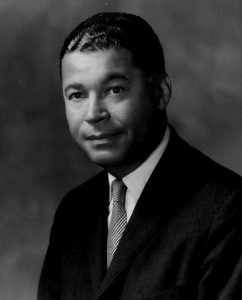This is the fifth and final post in our Black History Month series. Be sure to read our profiles of Philip A. Payton, Jr., Dorothy Mae Robinson and Samuel J. Cullers.

Life: 1919-2015
Birthplace: Washington, D.C.
Education: Howard University (BA), Boston University (LLB)
Edward Brooke was a legal trailblazer, paving the way for his fellow African Americans with his many “firsts.”
He was a decorated veteran and a 1948 graduate of the BU School of Law. After years of practicing law in Roxbury, he won the Republican 1960 nomination for Massachusetts secretary of state, becoming the first Black person to be nominated for statewide office in Massachusetts. In that race he was defeated by the Democrat (and later, Mayor of Boston), Kevin H. White, whose campaign issued “Vote White” bumper stickers.
Two years later though, Brooke ran again and won, becoming the nation’s first African American state Attorney General in Massachusetts.
In 1966, Brooke became the first Black person ever elected to the U. S. Senate by popular vote. He won as a Republican in an overwhelmingly Democratic Massachusetts and was known for his ability to reach across the aisle on important issues. He was the first African American to represent Massachusetts in the U.S. Congress.
While in the Senate, Brooke was committed to addressing housing issues. In collaboration with Democratic Minnesota Senator Walter Mondale, he co-sponsored the Fair Housing Act of 1968, which “prohibited discrimination concerning the sale, rental, and financing of housing based on race, religion, national origin, sex, (and as amended) handicap and family status.” While advocating for the passage of this legislation, Senator Brooke spoke of cited his own difficulties in finding a home for his family after returning from service in WWII to illustrate the prejudice in the housing market.
A year later, the Brooke Amendment was passed in response to rent increases and complaints about services in public housing. The amendment capped public housing rent at 25 percent of a resident’s income. Congress raised the cap to 30 percent in 1981.
After leaving the Senate, Brooke continued his career in public service and practicing law in Washington, D.C. He served as chairman of the board of the National Low Income Housing Coalition, on President Reagan’s Commission on Housing, and the Senate’s Commission on Wartime Relocation and Internment of Civilians.
In 2000, the newly constructed Edward W. Brooke Courthouse was dedicated in his honor. He received the Presidential Medal of Freedom in a White House ceremony on June 23, 2004, and was awarded the Congressional Gold Medal in 2008.
Continuing this Work Today
As the co-author of the 1968 Fair Housing Act, Senator Brooke called attention to the fair housing crises, which ultimately led to the creation of the Office of Fair Housing and Equal Opportunity. Today, the mission of the FHEO to to create equal housing opportunities for all persons living in America by administering laws that prohibit discrimination in housing on the basis of race, color, religion, sex, national origin, disability, and familial status.
What to Read Next
- Bridging the Divide: My Life, his autobiography published in 2006


